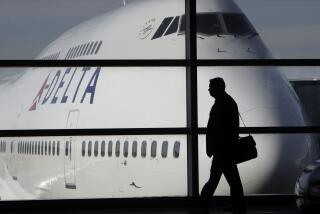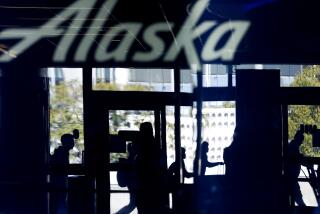Crisis Grows for Airlines Worldwide
- Share via
The global airline industry further slashed flight schedules and eliminated thousands of jobs Wednesday in the face of at least $7 billion in losses because of the plunge in travel after the terrorist attacks.
International air travel is expected to drop 5% this year, a decline that is already creating problems for a host of related industries. This year is shaping up to be only the second year since World War II that worldwide air traffic will have declined. The other year came a decade ago, during the Persian Gulf War.
Delta Air Lines joined nearly all of the major U.S. and foreign airlines in scaling back. The third-largest U.S. carrier said it would cut its schedule 15% by Nov. 1 and jettison 13,000 jobs over the next several months.
Atlanta-based Delta “is experiencing negative cash flow” and the cuts are mandatory “until a more stable economic environment returns to the aviation industry,” Delta Chairman Leo Mullin said in a statement.
Other airlines around the globe also are cutting their operations 10% to 20%, mainly because the U.S. market--both for business and leisure travel--represents such a big chunk of their overall revenues. For consumers, that will mean fewer choices among both U.S. and foreign carriers when it comes to finding flights overseas.
Air France, for instance, chopped its U.S. winter schedule by 20%, though it said “we have no plans to close any of our 12 U.S. gateways and remain committed to this market.”
The ongoing curtailment of airline service comes as President Bush prepares to visit Chicago’s O’Hare International Airport today, both to announce more airline safety proposals and to encourage the public to start flying again.
But the shock waves have moved quickly beyond the airline industry. The cutbacks have idled about 1,000 jets in the United States alone and triggered plans to lay off more than 30,000 at Boeing over the next year. Airline-food caterers have also been hit, cutting about 8,000 jobs Wednesday. Meanwhile, the tourism and lodging sectors are just starting to feel the impact of the travel downturn, which is expected to last at least through the end of the year.
U.S. and foreign airlines combined are expected to lose at least $7 billion this year, mainly because of the attacks, said Tim Goodyear, a spokesman for the International Air Transport Assn., an industry trade group based in Geneva.
That scenario is based on a forecast 15% decline in international air travel for the last four months of this year, and a 5% drop for all of 2001, he said. The last year air traffic contracted was in 1991 when travel also fell 5%, according to the IATA.
The latest carriers to announce cutbacks Wednesday included Air Canada, which reduced its schedule 20% and laid off 5,000 employees, and Scandinavian Airlines System--the region’s biggest carrier--which said it plans to shave capacity 12% and eliminate up to 1,100 jobs.
Air Canada also is among those foreign airlines seeking financial help from their home governments, just as the U.S. airlines secured a $15-billion bailout from Washington that includes $5 billion in direct aid. In the meantime, some carriers such as KLM Royal Dutch Airlines are adding a surcharge to ticket prices to help offset higher costs for security and insurance.
There is concern among many European airlines that the bailout will give U.S. carriers a competitive advantage in the transatlantic market unless European carriers also get aid. Otherwise, they contend, U.S. airlines will have the financial wherewithal to drive fares lower on those routes and gain market share.
But Delta’s Mullin said the $5 billion in cash would merely cover the U.S. airlines’ losses for the month of September, and companies will still face massive problems well into next year.
And, like their American counterparts, many foreign airlines already were in financial trouble before Sept. 11, owing to sluggish economies worldwide. But the instant drop in passenger traffic after the attacks prompted the airlines to immediately cut back.
British Airways is trimming its schedule by 10%, and eliminating 7,000 positions. Another transatlantic carrier, Virgin Atlantic Airways, lopped 1,200 of its 9,000 employees as it reduced its schedule 20%.
Alitalia, Italy’s national airline, is scaling back its operations because of a projected 14% drop in passenger traffic over the next six months. The pullback will mean 2,500 lost jobs.
Transpacific airlines are faring no better. “Flights out of Japan to the United States have been less than half full,” said Thomas Fredo, a spokesman for Japan’s All Nippon Airways in New York. “Many Japanese are postponing their travel plans because it’s a time of uncertainty.”
All Nippon said flights from the United States to Japan are a little more crowded, but that is because “a lot of Japanese were here before Sept. 11, and many of them have been returning” in just the past few days, Fredo said.
Singapore Airlines likewise has seen a downturn in terms of passenger traffic, said spokesman James Boyd in Los Angeles. So far, though, the carrier has cut only one of its 45 weekly flights between Singapore and the United States, which includes 14 flights a week to Los Angeles.
In fact, Singapore Airlines is trying to get more people back into the air by touting fare sales announced before Sept. 11. For instance, on certain U.S.-Hong Kong flights, passengers can lay over one night at a Singapore hotel for $1, Boyd said.
The attacks also are not going to block the return of the supersonic Concorde, according to the two airlines that still fly the 100-seat, bird-shaped jet, British Airways and Air France. Both stopped flying the plane after an Air France Concorde crashed outside Paris on July 25, 2000, killing 114 people.
British Airways expects to start taking reservations soon and to begin flying three of its seven Concordes in late October. Air France hopes to start service again in November.
But the situation is otherwise gloomy as the airlines adapt to the slump in traffic. All Nippon’s Fredo noted that many U.S. business conferences that were expected to attract foreign visitors were canceled after the attacks, and that foreign tourists are delaying trips to U.S. vacation spots.
“Where people have the discretion to change their plans, many of them are,” he said.
On Wednesday, Lufthansa’s LSG Sky Chefs division, the largest U.S. airline caterer, said it plans to cut up to 4,800 jobs, and earlier this week Swissair said it is cutting at least 3,000 jobs from its catering division, Gate Gourmet.
Like other travel-related industries, airline food service providers also have appealed to Congress for financial assistance.
*
Times wire services contributed to this report.
More to Read
Inside the business of entertainment
The Wide Shot brings you news, analysis and insights on everything from streaming wars to production — and what it all means for the future.
You may occasionally receive promotional content from the Los Angeles Times.











